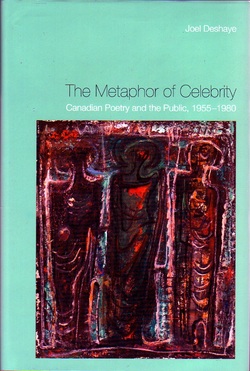
In “The Era of Celebrity in Canadian Poetry,” the second chapter of his The Metaphor of Celebrity: Canadian Poetry and the Public, 1955-1980, Joel Deshaye declares that 1955-1980 was Canadian poetry’s “era of celebrity.” He doesn’t find many celebrity poets, however. He proposes only four possibles: Irving Layton, Leonard Cohen, Michael Ondaatje and Gwendolyn MacEwen, the latter whom he qualifies as “a celebrity of low degree compared to some of her contemporaries” (200). Ondaatje also seems a questionable celebrity in this period by the criteria that Deshaye uses, although he’s undoubtedly had later moments as an international novelist-celebrity. Deshaye’s readers could well wonder how many celebrities it should take to make an “era.” Even Deshaye at times in this chapter seems unimpressed by the degree of celebrity he can establish for any of his poets, at one point writing that he hopes only to recognize “the real, though limited, success of this group of poets beyond and in the literary field ordinarily assumed to be incapable of supporting stardom” (44).
Certainly Deshaye appears to have no interest in glamourizing his 1955-80 era. He is, in fact, often usefully cynical about the ambitions of the four writers and the means they used to achieve them, calling their claims to spiritual insight “religious pretence” (11) and the textual enactments of masculinity by the male poets unconscious “parody” and “grandstanding” (7). He implies that their themes of personal freedom – frequent in Layton – may have been a grasping at an illusion, and that their self-portrayals as sacrificing themselves for their art were mere posturing in hope of attracting empathetic fans.
Most of the poets in this study wrote about themselves as if they were more widely recognized
than they were in reality, or wrote as if they were other celebrities of higher degree. I call this
self-aggrandizement "grandstanding" to suggest that their self-promotion and identity formation
depend on metaphor .... (15)
Sacrificing “themselves” is a rather problematic concept for Deshaye because in his various comments on identity formation (which he evidently understands through Diana Fuss’s theories of metaphoric substitution) he shows little
 RSS Feed
RSS Feed